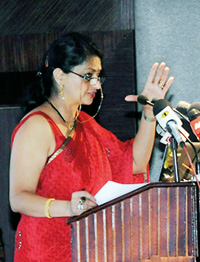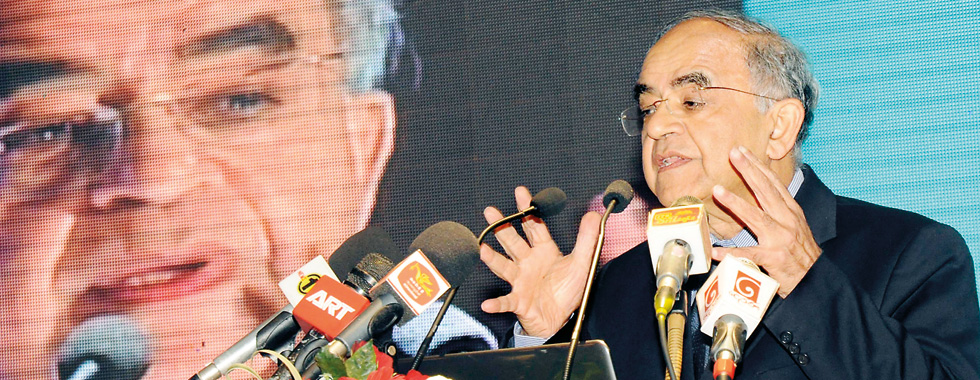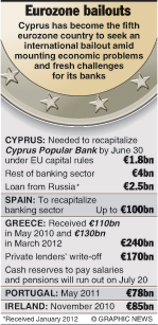Rule of law and good governance prerequisite for good business environment
By Quintus Perera
Kalpana Kochhar Pix. by Saman Kariyawasam
Regional Free Trade Agreements help smaller nations as long as they remain attractive to investment but that depends on peace and it is extremely important that there is rule of law and good governance.
This was stated by Gurcharan Das, Author, Columnist and Management Consultant, India speaking as the guest speaker at the inauguration of the 13th Annual Sri Lanka Economic Summit 2012 organized by the Ceylon Chamber of Commerce (CCC) held in Colombo this week. Speaking on “Are there lessons for Sri Lanka from the experiences of the SARRC countries?”, he said attractiveness should be coupled with peace with the rule of law essential, thus investors should feel that nobody is above the law. He said that Sri Lanka is surrounded by two large fastest growing countries- India and China- and explained how these countries grew.
India was maintaining 9% growth for five years, before the global financial crisis, but dropped to 8.4% and last year dropped further to 6.4%. Yet he said today a third of India is in the middle-class. Between 2020 and 2022 this middle-class would grow to 50%. He said that India has had prosperity for the last three decades. He said that this drop is very painful as it would affect 42 million people losing direct and indirect jobs. He said that China is rising above and far ahead of India. India is rising from below and has a weak government which sleeps. So India grows in the night, while China grows during the day. He said that Sri Lanka should grow during the day. Better governance is vital to grow during the day, he said. As Sri Lanka speaks of being an attractive destination, good governance should be predictable. Mr Das said that though there should be infrastructure, more than all governance matters. With free market there should be good governance and reforms as with bad governance and no reforms, corruption tends to creep in.

Gurcharan Das
He said, “If governance is right, the private sector in Sri Lanka will just take-off.” Ideally there should be a rule-based society. Three qualities should be in place to be a classically liberal state: an executive that moves rapidly when required; essentially the rule of law and accountability, which are difficult to achieve unless there is hard work, reforms, and commitment to freedom, freedom of enterprise. Mr Das said free trade leads to prosperity of nations. He said that former US President Bill Clinton persuaded Americans, Mexicans and Canadians to establish the North American Free Trade Agreement (NAFTA) and he succeeded and all the three nations have become big winners. Driving his point home, he said that he worked for Proctor and Gamble and his company alone has shifted 47 factories from the US to Mexico. He said that Mexico created an inviting environment for investments. He said, “So we need to do something with the South Asian Free Trade Agreement.” He said that in the history of the Indian sub-continent an enormously important phase has come up when in February this year Pakistan and India got into a free trade agreement. “If we play the cards right, everybody will win.
The smallest countries will win more as long as they remain attractive to investment,” he added. Dr (Ms) Kalpana Kochhar, World Bank, South Asia Chief Economist making the keynote address on “Emerging Global and Regional Prospects and the Benefits of Regional Co-operation” said that the global economy is vulnerable and though Sri Lanka experienced high growth it too is vulnerable and to be in the range of 8% growth, Sri Lanka has to meet the challenges of a competitive global market. Susantha Ratnayake, Chairman, CCC, welcoming the guests said that they bring together, policy makers, implementers, business community, academics and experts for this 2-day summit.
He said that they are mandated to bring together the private and the public sectors to work towards economic progress and while there is tremendous opportunity to be set on a new path of development, though there were setbacks, there was good work. He cautioned that there is also a tremendous lot more to be done. They cannot blame the conflict any more, but have to work on new thinking and have a new mindset. He said that there is a lot of uncertainty in the global economy and the global economic crisis has still not recovered.
He said that now the attention is diverted to Asia, with most emerging economies being in Asia, the world is looking to Asia to lead growth and the shift from west to east creates new opportunities and challenges for Sri Lanka. Dr Sarath Amunugama, Senior Minister of International Monetary Cooperation, speaking as Chief Guest dwelt upon the achievements of the government and also emphasized the strategic geographical importance of the Hambantota harbour which is very close to the maritime naval route. He conceded that the Foreign Direct Investments are lower than the expectations and pointed out that attempts should be made to increase to meet the set targets.
















